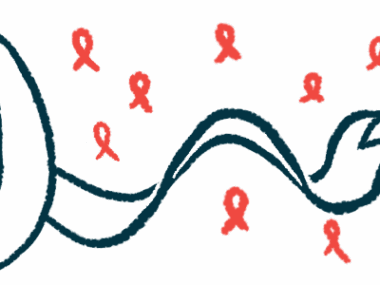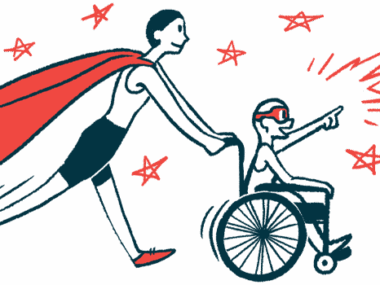Sarcoidosis storyline in Netflix’s ‘No Good Deed’ true for many patients
Hopefully, the show will promote greater awareness of this disease
Written by |

It’s pretty rare to see sarcoidosis portrayed on a television show that’s not a medical drama. It’s even rarer to see it represented accurately. So when I heard the word on the new Netflix series “No Good Deed,” my ears perked up and I dropped what I was doing to give it my full attention.
The dark comedy revolves around the Morgan family, who is selling their home, and a few prospective buyers. Through eight episodes, we see each character’s secrets, lies, and deceptions come to light. (Don’t worry, I won’t reveal any spoilers.)
One prospective buyer, Dennis (played by O-T Fagbenle), goes to the doctor for a tetanus shot after cutting his finger on a rusty nail. The doctor asks about Dennis’ medical history and suggests some lab work. Here, Dennis reveals that his father died of sarcoidosis at 39 years old.
When the doctor calls with test results, Dennis is visibly shaken. He has written “elevated cal” and “schedule CT” on a notepad, and his phone shows the results of an internet search. Dennis learns that hypercalcemia is a “complication of sarcoidosis, which can affect the heart, with cardiac involvement being a common cause of death.”
What struck me most, though, was the reaction to this news. Thinking about his father and what he has just read, Dennis believes he is dying. He is convinced that he doesn’t have much time left and wants to be sure his family will be taken care of after he is gone.
It’s an understandable fear. When I was diagnosed with sarcoidosis and jumped online to learn more, the first thing I saw was that comedian Bernie Mac had died from it, and now his widow runs the Bernie Mac Foundation in his memory. Naturally, I wondered if that would be my fate, too.
It’s not only Dennis’ reaction that feels so familiar. When he tells his wife, Carla (played by Teyonah Parris), that he is dying, she dismisses his concerns. “I WebMD’d sarcoidosis,” she says, “and you just have elevated levels. Odds are you’re fine.” She adds for emphasis that as a pregnant Black woman, she is more likely to die than he is. This may or may not be true, but she says it in that moment only to invalidate his feelings.
That dismissive attitude is all too familiar to anyone living with sarcoidosis. When people don’t understand this disease, they tend to minimize — to trivialize — our experience. Just about every sarcoidosis warrior I know has heard, “At least it’s not cancer,” “You don’t look sick,” and other equally unhelpful responses. I appreciate that the intention is most likely to console us, but these statements tend to have the opposite effect.
When Dennis tells Carla that he has to have a CT scan, she appears to share his concern for a brief moment before again shutting down his worry, telling him it’s “just a formality.” This reminds me of the way many people dismiss what we often say about fatigue, shortness of breath, and other sarcoidosis symptoms. It’s only when we have to get a chest X-ray or cardiac MRI that they realize our condition may be serious.
Later in the series, Carla tells Dennis’ mother, Denise (played by Anna Maria Horsford), about his health. “He’s scared he’s gonna die like his father,” she explains, because “sarcoidosis is hereditary, and he got this from your husband.” While sarcoidosis is more common among families with a history of the disease, it is not a directly inherited trait passed down like hair or eye color.
Moreover, sarcoidosis is not an automatic death sentence, as Dennis fears. It is often called a snowflake disease because it can present differently in each person who is diagnosed. For some, it can be a one-time episode; for others (like me), it can be chronic. Sarcoidosis can affect any organ or system in the body; its effects can range from undetectable to severe, and many symptoms can be alleviated with treatment.
Ironically, one of the most relatable parts of this storyline is how abruptly it is dropped. We don’t find out the results from Dennis’ CT scan, nor do we learn what is causing his elevated calcium levels. Is it sarcoidosis? Is it serious? We may never know.
Sadly, many people with chronic illnesses like sarcoidosis can go years without definitive answers. We have out-of-range lab results that doctors can’t explain or symptoms that don’t align with “normal” labs (or, quite often, both). With some doctors, the conversation ends before it even begins.
Our collective story can improve only with greater awareness of this disease. Dennis’ storyline brings sarcoidosis into view just enough for viewers to raise questions about it and (hopefully) search for answers. That is definitely one good deed.
Note: Sarcoidosis News is strictly a news and information website about the disease. It does not provide medical advice, diagnosis, or treatment. This content is not intended to be a substitute for professional medical advice, diagnosis, or treatment. Always seek the advice of your physician or other qualified health provider with any questions you may have regarding a medical condition. Never disregard professional medical advice or delay in seeking it because of something you have read on this website. The opinions expressed in this column are not those of Sarcoidosis News or its parent company, Bionews, and are intended to spark discussion about issues pertaining to sarcoidosis.







Dee
I got the diagnosis of Sarcoidosis by phone in 2006. The specialist that called me said this: "you have sarcoidosis, you are not going to die, but it isn't good, it is bad. Do not Google it before you have seen the lung specialist."
What did I do? I panicked and ofcourse, I googled it. Saw mostly horror stories back then.
🦋 Kerry Wong
Ooh, Dee - of course we're going to Google it, but I do understand why they say that. The best we can do is find reliable sources or to get information, and connect with other sarc warriors to share our experiences.
~🦋
Jeanne Mehaffy
My husband was watching that episode, I was in the kitchen baking and kept hearing the word "sarkadosis". I walked into the room and asked my husband if the guy was trying to said Sarcoidoisis? In the 38 plus years since being diagnosed, I have never heard one medical provider or a medical drama on TV pronounce it "sarkadosis. Now every time my husband is watching and I hear the "sarkadosis", I stop what I'm doing and said it correctly. Anyone else ever hear it pronounced that way?
🦋 Kerry Wong
Wow, Jeanne, that's a long time to live with this disease. You must have seen and heard a LOT.
I've heard plenty of mispronunciations, including "sarkadosis." My favorite is simply "sarca-what?!" But just like when we hear misinformation, the best thing we can do is correct it!
~🦋